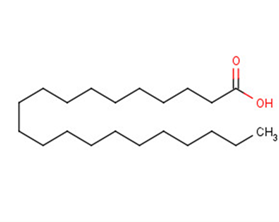
Heneicosanoic acid
CAS No. 2363-71-5
Heneicosanoic acid( Heneicosylic Acid | C21:0 )
Catalog No. M20013 CAS No. 2363-71-5
Heneicosanoic acid (HEA) is a fatty acid found in human milk fat. HEA is also a part of the phospholipids of the articular cartilage boundary lubricant. HEA is a constituent of red blood cell fatty acids.
Purity : >98% (HPLC)
 COA
COA
 Datasheet
Datasheet
 HNMR
HNMR
 HPLC
HPLC
 MSDS
MSDS
 Handing Instructions
Handing Instructions
| Size | Price / USD | Stock | Quantity |
| 500MG | 77 | In Stock |


|
| 1G | Get Quote | In Stock |


|
Biological Information
-
Product NameHeneicosanoic acid
-
NoteResearch use only, not for human use.
-
Brief DescriptionHeneicosanoic acid (HEA) is a fatty acid found in human milk fat. HEA is also a part of the phospholipids of the articular cartilage boundary lubricant. HEA is a constituent of red blood cell fatty acids.
-
DescriptionHeneicosanoic acid (HEA) is a fatty acid found in human milk fat. HEA is also a part of the phospholipids of the articular cartilage boundary lubricant. HEA is a constituent of red blood cell fatty acids.
-
In Vitro——
-
In Vivo——
-
SynonymsHeneicosylic Acid | C21:0
-
PathwayOthers
-
TargetOther Targets
-
RecptorOthers
-
Research Area——
-
Indication——
Chemical Information
-
CAS Number2363-71-5
-
Formula Weight326.56
-
Molecular FormulaC21H42O2
-
Purity>98% (HPLC)
-
SolubilityEthanol: 20 mg/mL;DMSO: Soluble
-
SMILESCCCCCCCCCCCCCCCCCCCCC(O)=O
-
Chemical Name——
Shipping & Storage Information
-
Storage(-20℃)
-
ShippingWith Ice Pack
-
Stability≥ 2 years
Reference
1.Mosley EE et al. trans Fatty acids in milk produced by women in the United States. Am J Clin Nutr. 2005 Dec;82(6):1292-7.
molnova catalog



related products
-
Azido-PEG3-azide
Azido-PEG3-azide is a PEG-based PROTAC linker that can be used in the synthesis of PROTACs.
-
AX-024 HCl
AX-024 hydrochloride is an cytokine release inhibitor which can strongly inhibit the production of interleukin-6 (IL-6), tumor necrosis factor-α (TNFα), interferon-γ (IFN-γ), IL-10 and IL-17A.
-
Melanin Concentratin...
Melanin Concentrating Hormone, salmon MCH, salmon



 Cart
Cart
 sales@molnova.com
sales@molnova.com


